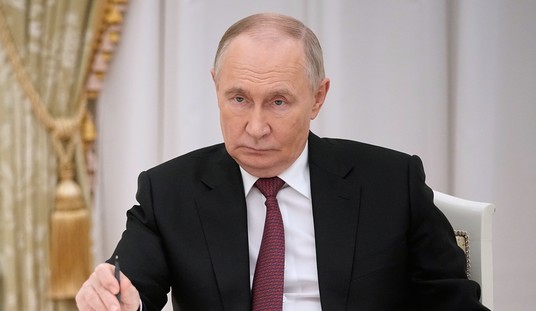The war between Russia and Ukraine for control of the eastern portion of that nation never stopped, but a brief lull in the fighting prompted by the onset of winter and coinciding with a ceasefire arrangement signed by all combatants in Minsk gave the illusion that the conflict had largely been settled.
Maybe that pause in the intensity of that war led Barack Obama to conclude that it was acceptable to conspicuously blow off NATO officials even while Moscow again prepared to press its interests in Ukraine. Obama has reversed this course and will reportedly meet with NATO Secretary General Jens Stoltenberg in May, but the war in Europe may be again in full swing when the president gets around to taking renewed interest in it.
In an interview with the Associated Press, Ukrainian rebel leader Andrei Purgin revealed that the Minsk ceasefire agreement, which was never really observed by any of the parties involved in that conflict, was essentially void because Kiev had refused to provide the “Donetsk People’s Republic” with full autonomy.
“The Minsk agreement isn’t working, because the Ukrainian side has blocked it by the actions of the Rada,” Purgin said on Monday.
The Rada, the Ukrainian parliament, passed a bill granting autonomy to an area in the east earlier this month but put the implementation of the law on hold until a local election is held there under Ukrainian laws, in line with the Minsk agreement. The lawmakers argued that the law cannot be implemented while the area is controlled by Russia-backed separatists.
“Hostilities have subsided across the region but flashpoints of fighting remain,” The AP reported. “One Ukrainian soldier died and three were injured in the past 24 hours, according to Ukrainian military spokesman Andriy Lysenko.”
As rebel factions define the casus belli that would compel pro-Russian forces to again wage renewed offensives in eastern Ukraine, the likely targets of rebel aggression are already widely known.
“The far-right Azov battalion, whose symbol resembles a black swastika on a yellow background, is preparing to defend the port city of Mariupol in southeastern Ukraine against a widely expected attack by pro-Russian separatists,” Reuters reported last week. “Mariupol, which Azov helped recapture from the rebels last year, is a big prize. Its capture would offer the separatists the chance to open a road further south a year after Russia annexed the Black Sea peninsula of Crimea from Ukraine.”
This map via The Mirror helps to show why Mariupol is such a strategic prize, and why it is unlikely that pro-Russian forces will stop there:
The rebellious factions in the east are not without support from their Russian patrons as they gear up to relight the fires of war in Ukraine. According to pro-Kiev sources in the country’s east, Russian heavy weaponry is again pouring over the border.
“[deputy head of Ukraine’s anti-separatist military operations in Donetsk and Luhansk Valentin] Fechev told the regional government website that 22 tanks had crossed from Russia via the border town of Gukovo, into Ukraine’s Luhansk region, heading toward the city of Sverdlovsk for maintenance,” Newsweek reported on Monday.
On Sunday night 15 separatist Grad missiles were fired at the Ukrainian city of Horlivka. The Donetsk administration explains that pro-Russian fighters had received 122mm Grad missiles as part of one of Russia’s so called “humanitarian convoys”, which continue to arrive in the rebel-held regions.
According to the local administration the pro-Russian rebels underwent military exercises several days prior in the town of Yenakiieve, using heavy artillery and guns with the aim of eventually stationing them in the town of Horlivka.
Fechev said that fighters as well as equipment crossed the border from Russia to Ukraine last weekend, claiming that more than 800 Russian mercenary fighters had entered Ukraine to fight over the last few days. He went on to say that these fighters are there for “the gain of personal wealth”, rather than being motivated by the idea of resurrecting a ‘New Russia’ (Novorossiya) in Ukraine.
When the war in Europe erupts again, will the president who flagrantly ignored NATO officials in March feign surprise? If he does, it will be up to the political press to protest the insult to the country’s intelligence. Let’s hope they rise to the occasion.









Join the conversation as a VIP Member